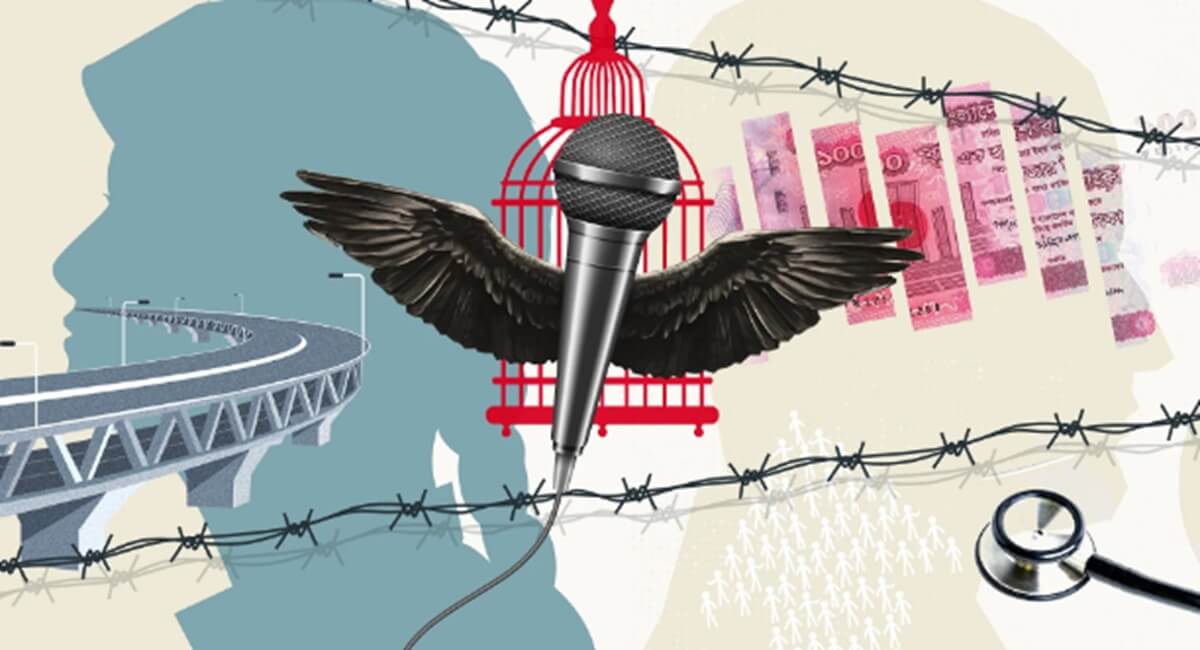Freedom vs prosperity: A rehash of the development vs democracy debate
Zillur Rahman | 23 May 2024
The Atlantic Council, a US-based think tank, recently published a report that poses the question: does freedom lead to prosperity, or does prosperity lead to freedom? In the findings of the research, it is stated that there is strong evidence that increasing freedom in a country eventually leads to prosperity in the long term.
The report also indicates that even though Bangladesh has become one of the more prosperous nations among neighbouring countries, the freedoms enjoyed by its people have gradually declined over the past 22 years. In the context of the report, "freedoms" refer to political freedom, economic freedom, and legal freedom. Meanwhile, prosperity is quantified through indexes of education, income, health, inequality, environment, and minority rights. The data in the report showed that economic freedom in Bangladesh grew to an extent in the early 2000s but is now relatively stagnant, while political and legal freedoms have been declining since 1995. The clear implication of this data is that the current level of prosperity that Bangladesh is enjoying is not sustainable.
Although the report uses broad definitions for what it counts as "freedom" and "prosperity," the argument brought forth is essentially the same one we have been having in Bangladesh for a very long time: the argument of development versus democracy.
The declining freedoms identified in the report once again give a clear indication that the consecutive governments of Bangladesh, from multiple political parties, have repeatedly failed to empower the country's people. The inequality in society keeps growing, corruption runs rampant, and certain beneficiary groups have hijacked the trajectory of development in Bangladesh, ensuring a fundamentally uncompetitive market, where the only ways to success are through underhanded violations of the rule of law, unethical exploitation of the poor, and undermining of the promises of democracy and social justice underpinned in our constitution.
Apologists of the current government's shortcomings have, as usual, resorted to using the age-old talking points taken by undemocratic actors. They will argue the opposite of the data, stating that it is the development that eventually leads to democracy. Therefore, development should be prioritised first, even if it comes at the expense of democracy. They will, of course, not answer the questions of how development can be kept inclusive and sustainable if the process of development is not democratic.
Other undemocratic talking points include indicating how exploitation, inequality, and breach of human rights were once a norm hundreds of years ago, which allowed Western nations to accumulate wealth in a brutal fashion in the form of colonialism, and their current development is a direct result of the harsh reality of early era capitalism. This line of argument is particularly absurd, as it readily admits that the method being taken by the current government is similar to the colonial exploitation of the past. Humankind records history with the hope that we will not repeat the mistakes of the past. There is no rush for Bangladesh to become some kind of emerging world power. Our nation is young. We can take our time to build it in a way that benefits us all. We do not need to sacrifice fundamental rights and the agency of the people in order to develop. Both democracy and development should have equal weight.
Another favourite hobby of undemocratic actors is repeatedly pointing out the examples of Singapore and China to try and bolster their talking points of how it is possible to achieve prosperity even without democratic development. If the current or past leadership of Bangladesh had the capacity to turn Bangladesh from a third-world to a first-world country within a single generation, as what happened in Singapore under the stewardship of Lee Kuan Yew, then perhaps this comparison could have a leg to stand on. All current data indicates that Bangladesh will not be turning into a first-world country any time soon. In fact, the failures of the government to reduce inequality and ensure freedoms are now actively driving away foreign direct investment. On the other hand, if Bangladesh had an abundance of raw material resources like China, which it could use to become a worldwide manufacturing powerhouse, then perhaps a comparison to China could have been made. But that is not the reality. The main resource of Bangladesh is its people. Bangladesh's only way forward is to give its people better opportunities for economic, social, and cultural growth. And this can only be done in a better democratic environment.
To some readers, all these points and counterpoints will seem extremely common. That is because the argument being had has not changed. Whether it is freedom versus prosperity or development versus democracy, there has always been only one right answer. There should be no dichotomy between these factors. Freedom is prosperity, and prosperity is freedom. One cannot grow sustainably without the other, and the responsibility of the state is to grow both in tandem.
The evidence is clear, and so is public opinion on the matter. The government has neglected to strengthen democracy in Bangladesh, and it is failing to provide economic, political and legal freedom for its people. It is relatively easy to receive funds and technical expertise from foreign friends when building roads, bridges, and power plants. However, by stating that democracy will come later, they repeatedly pass on the responsibility of the truly difficult and important tasks of nation-building to future generations, who will ultimately have to shoulder the cost of this so-called development.
Zillur Rahman is the executive director of the Centre for Governance Studies (CGS) and a television talk show host. His X handle is @zillur
This article was originally published on The Daily Star.
Views in this article are author’s own and do not necessarily reflect CGS policy
